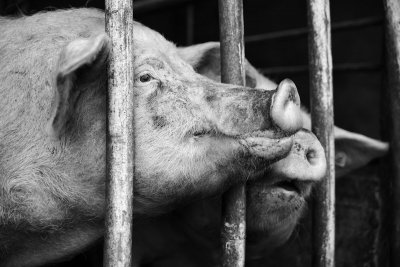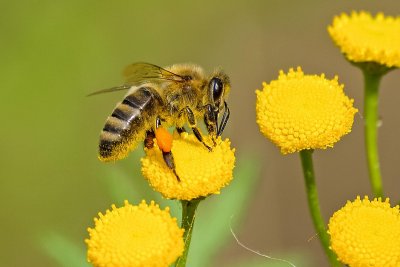News • Sustainable Farming Campaign
Antibiotic resistant bacteria found in rivers near UK factory farms
Investigation by Alliance to Save our Antibiotics, World Animal Protection and the Bureau of Investigative Journalism highlights new consequences of antibiotic use on factory farms.

Antibiotic resistant bacteria has been found in UK rivers prompting calls on the UK government for an urgent ban on the routine use of antibiotics on healthy farm animals.
The new report Life-threatening superbugs: how factory farm pollution risks human health is the first of its kind in the UK and the results expose the far-reaching implications of factory farms on animal welfare, human health and our environment.
Antibiotic resistant bacteria were found in rivers and waterways in areas with high levels of factory farming. Two common bacteria that can cause infection and illness in humans and animals are E. coli and S. aureus; antibiotic-resistant Escherichia coli (E. coli) and Staphylococcus aureus (S. aureus) were isolated in rivers adjacent to both pig and chicken factory farms and higher-welfare outdoor farms, as well as in slurry runoff from intensive dairy farms. Antibiotic resistance genes were also found.
Samples were taken around factory farms in areas around the UK with high levels of farming including Sussex, Norfolk and the Wye Valley, which has made headlines recently due to the level of pollution from runoff from chicken farms causing high levels of nitrates and phosphorus and creating ecological dead zones.
Key findings:
· Resistance was found to the antibiotic cefotaxime in E. coli and vancomycin in S. aureus. Both of these antibiotics are classified by the World Health Organization as highest-priority critically important antimicrobials in human medicine. Resistance was also found to ampicillin, cefazoline and trimethoprim in some of the E. coli, and erythromycin and trimethoprim in some of the S. aureus. All these antibiotics are classified as highest-priority critically important, critically important or highly important in human medicine.
· Testing was also carried out for two antibiotic-resistance genes, Sul1 and Tet b. When bacteria acquire antibiotic-resistance genes, they may become antibiotic resistant. Sul 1, which confers resistance to sulphonamides, which are classified as highly important in human medicine, was found more consistently downstream than upstream of factory pig and chicken farms. This suggests resistance is entering the environment from these farms.
· None of the four higher-welfare outdoor pig or chicken farms tested had higher levels of any type of resistance downstream than was found upstream. This means that no evidence was found that these higher-welfare farms are contributing to superbugs in the environment. On the other hand, six of the eight intensive farms had more of at least one type of resistance downstream than upstream.
Cóilín Nunan, scientific adviser to the Soil Association and to the Alliance to Save Our Antibiotics, said: “The rise of antibiotic resistance already kills more than a million people a year globally and scientists are saying that resistant bacteria in the environment are adding to the problem. Most antibiotics taken by people or animals are excreted, along with antibiotic-resistant bacteria. When manure or slurry is spread on land, this increases the number of resistant bacteria in soils and water, and these can end up on crops. The best way to reduce farming’s impact is to make large cuts to antibiotic use, and this means keeping animals in healthier conditions so they rarely need medication.”
Around 80% of all animals in the UK live on factory farms. These farms’ squalid, cruel and cramped conditions force the need for wide-scale preventative antibiotic use – without which those animals would not survive. Superbugs from factory farms reach people in many ways: via our rivers, for example; in drinking water; swimming and recreational activities; or the consumption of fish from contaminated waters. Unless the government takes action, the UK faces a human health crisis whereby disease can no longer be treated due to antibiotic resistance.
The UK farming industry has managed to reduce its antibiotic use by 55% since 2014, but far greater reductions are still needed. Unfortunately, the UK government has refused to ban preventative group treatments - as the EU has done - despite having previously promised to do so. The World Health Organisation estimates that 1.27 million people die globally each year as a direct result of antimicrobial resistance (AMR1), and this will rise to 10 million by 2050 if action is not taken now. This would far outweigh the impact of Covid 19 and make minor infections and common surgeries potentially deadly.
Worldwide, approximately sixty-five percent of antibiotics are used on animals to prevent them getting ill in poor conditions, placing a burden on health services.
You can read the BBC coverage of the report here and the full report here: Life-threatening superbugs: how factory farm pollution risks human health
Published Tuesday 22 November 2022
Sustainable Farming Campaign: Sustain encourages integration of sustainable food and farming into local, regional and national government policies.





